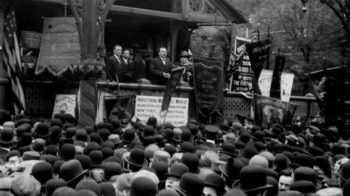Month: March 2016
James Connolly, New York and the Easter Rising
March 28, 2016
—Paul Moses
One of the many pleasures of researching a history of New York’s Irish and Italians was encountering the revolutionary heroes from both homelands who occasionally crossed the city’s stage. Among the most memorable of the Irish visitors is the socialist James Connolly, who is being remembered this weekend as the centennial of the 1916 Easter Rising is marked.
Adoption History and Women’s History Month
March 25, 2016
—Catherine Ceniza Choy
While Women’s History Month encourages us to recognize the individual achievements of pioneering women in various fields, that recognition should not be an end in itself. It would, and should, take far more than a month to find, reclaim, and remember women’s histories that have not yet been canonized.
Day of the Demagogue: Trumpian Deportation Fantasies and American Realities
March 24, 2016
—Tanya Golash-Boza
Should Donald Trump or Ted Cruz win the presidency, they are guaranteed to make life hell for millions of undocumented human beings living in and working extremely hard in this country, and their plans would fail dismally — but that failure would undoubtedly prove to be a horror all its own.
Women’s History: Rethinking Birth and Food
Let us not only celebrate the first woman to head an Obstetrics department, and the first woman at a five star restaurant, but all the women who came before them, whose knowledge is being threatened by professionalization and corporate industrial take-overs of both food and birth.
How much does religion matter in American elections?
March 23, 2016
If you believe in God, attend church or synagogue, and claim to pray for those afflicted by tragedy, it is supposed to demonstrate that you are a moral and therefor trustworthy candidate. But that seems to be changing—at least in this year’s electio
Tragedy and the Proper Name
March 18, 2016
So much of the way I think about tragedy as a genre and political category comes from the work of Raymond Williams’s Modern Tragedy, in which the critic labors to show how flawed the elitist linguistic divide separating tragedy as a high art (the tragedy of Comparative Literature, English, and Classics curriculums) versus tragedy’s everyday use as signifying a grave event, a calamitous lost.
Irish & Italians, rivals & allies: A St. Patrick’s Day appreciation of how, over time, two New York City immigrant populations learned to get along
March 17, 2016
St. Patrick’s Day is a perfect time to remember that rish and Italian immigrant groups — who did as much as any others to create the city we know and love — eventually came together and even intermarried on a large scale.




